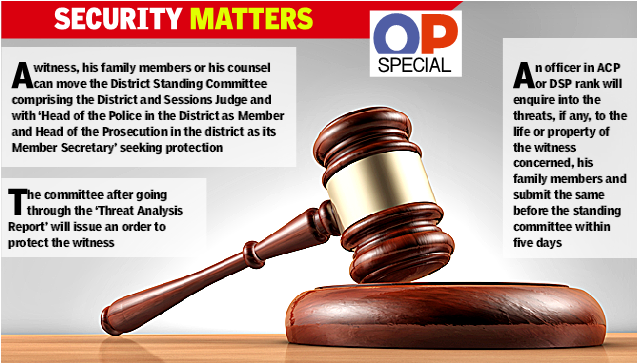Bhubaneswar: English philosopher Jeremy Bentham has rightly said, “Witnesses are the eyes and ears of justice.” At a time when the involvement of high-profile people in several crimes is coming to the fore and protection to the witnesses is increasingly felt, sources at Odisha police said that no such requests have come from the witnesses. Reason: Lack of awareness among the witnesses about the existence of such a scheme.
It is alleged that the witnesses are being threatened or pressurised against revealing anything related to the crimes before the investigating officials. But, sources in police revealed that the Odisha police is yet to receive any such requests seeking protection to the witnesses or their family members despite the lapse of more than a year since the implementation of the Witness Protection Scheme, 2019. No such applications have been referred to the police by any trial court too.
Meanwhile, the Director General of Police (DGP), Abhay, declared in March that office of the Crime Branch in Cuttack would work as the witness protection cell to look after proper implementation of the order for the protection of witnesses in the state.
Speaking to Orissa POST, a top police officer said that due to the onset of Covid-19 pandemic, the police force has been busy maintaining law and order. So, they failed to create adequate awareness among the witnesses regarding the scheme, he added.
Notably, a witness, his family members or his counsel can move the District Standing Committee comprising the District and Sessions Judge and with ‘Head of the Police in the District as Member and Head of the Prosecution in the district as its Member Secretary’ seeking protection.
Subsequently, an officer in ACP or DSP rank will enquire into the threats, if any, to the life or property of the witness concerned, his family members and submit the same before the standing committee within five days. The committee after going through the ‘Threat Analysis Report’ will issue an order to protect the witness.
The officers will try to ensure that ‘witness and accused do not come face-to-face during investigation or trial’. They have been asked to monitor the mail and telephone calls, make special arrangements with the telephone company to change the witness’ telephone number, temporary change of their residences, and installation of CCTV cameras before the residences of the witnesses. The local police will make arrangements to escort the witness to the court.
Notably, Odisha fared worst among the states with an abysmal conviction rate (5.7 per cent) in 2018, according to a report of the National Crime Records Bureau (NCRB). Mizoram topped the list with a conviction rate of 93.5 per cent. The NCRB data showed that Odisha’s conviction rate slipped to a new low from 9.3 per cent in 2017 when it was the second lowest after Bihar.
In 2019, Odisha ranked 4th among the states when the conviction rate was 21.5 per cent.
According to police officials, witnesses turning hostile is the biggest reason behind the extremely poor conviction rate.
Gyan Ranjan Mohapatra, OP






































